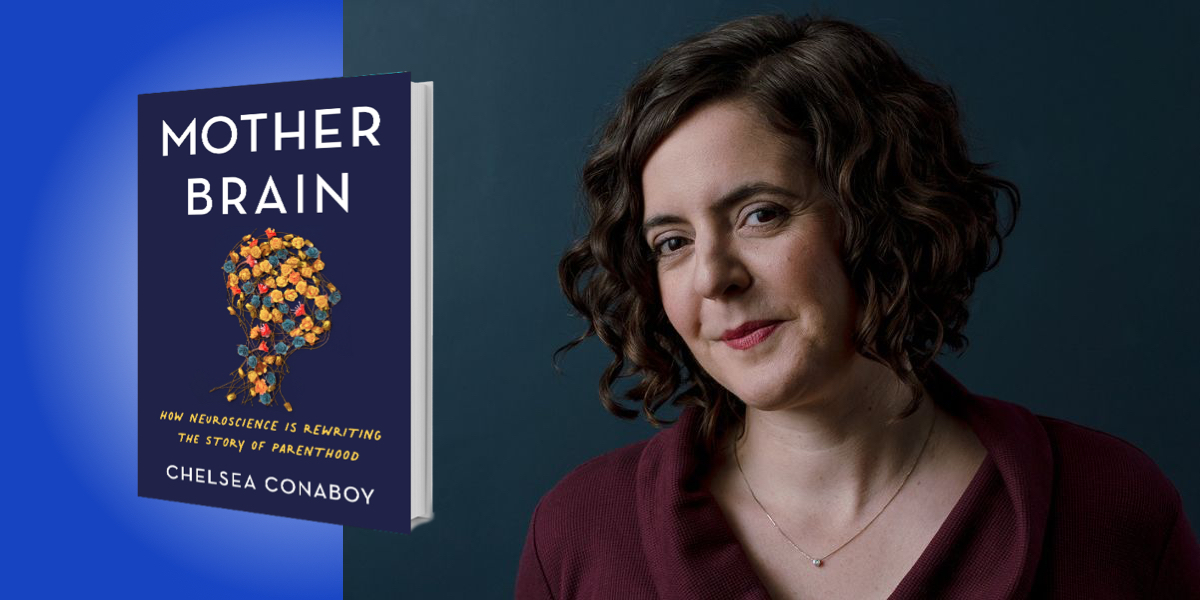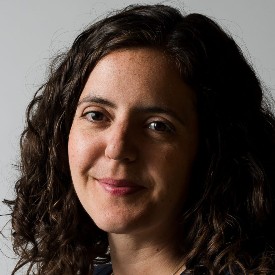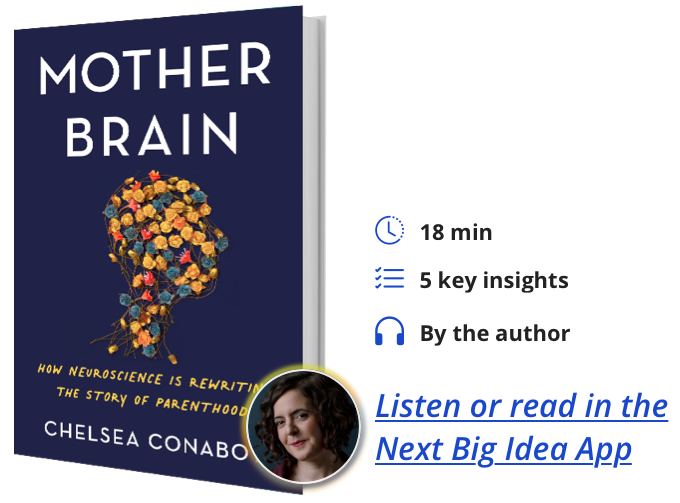Chelsea Conaboy is a journalist specializing in health and science. Her work has been published in a variety of publications, such as The Boston Globe, Mother Jones, Politico, The Week and Boston Globe magazine.
Below, Chelsea shares 5 key insights from her new book, Mother Brain: How Neuroscience Is Rewriting The Story of Parenthood. Listen to the audio version—read by Chelsea herself—in the Next Big Idea App.
1. Babies capture our attention, and they use it.
We often think about love as the thing that compels a parent to care for their child. From an evolutionary perspective though, love may not be enough. Love is neither universally reliable nor automatic. Feelings of ambivalence in the first days and weeks postpartum are common. At the very start, the adaptive parental brain does not rely entirely on love, or at least not the version of it we may know. Its first mission is to capture and to keep a parent’s attention.
In the early postpartum period, changes in the brain propel us into a state of hyper-responsiveness. We talk a lot about the dramatic shifts in hormones that come with pregnancy. That talk typically includes the “baby blues” and the idea that, for most people, things eventually settle out. In reality, this flood of hormones primes the brain for a period of plasticity, or malleability, so that babies—acutely powerful stimuli, with their potent cries and coos and cuddles—can go to work.
Brain regions related to motivation, vigilance, and meaning-making increase in activity and connectivity. In the early postpartum period, this responsiveness can feel intense and deliberately colored by worry. We are driven to pay attention to our babies, to respond to their needs.
It’s thought that over time, things shift to a more regulated state. Parents fine-tune their ability to recognize a child’s cues and predict their needs. Regions of the brain involved in self-regulation and in reading and responding to another person’s mental state and emotions change in function and structure. One researcher described it as though neural networks that support our ability to understand ourselves and to predict our own needs are essentially extended to encompass our child’s needs, too. This is a process that unfolds over time, one that is fueled at the start by attention.
It is something I wish I had understood when I was a brand new mother, full of worry about my son’s growth and well-being. I worried about the worry itself, too, as if it was crowding out the warmth and certainty I had expected to feel. Learning about the parental brain helped calm those fears. I wasn’t broken or failing him somehow, I was changing. I was in the middle of the most profound neurobiological upheaval of my adult life, through which I was becoming the mother my son needed me to be.
The great poet Mary Oliver urged us to bring children to the woods and “stand them in the stream,” to plant in them a love of nature. “Attention,” she wrote, “is the beginning of devotion.” This is true in parenthood too. Attention is the beginning of devotion. Frame those words. Hang them over the bassinet.
2. Every parent is changed by caregiving, not only gestational mothers.
Two important things seem to shape the parental brain: Shifts in hormones and experience, specifically time spent directly caring for a child. This is true for all parents, not only those who give birth to their children. Fathers experience significant changes in hormones, including testosterone, prolactin, and oxytocin, as they approach fatherhood and as they engage with their children. It’s thought that foster and adoptive parents also experience hormonal changes. A growing body of research has found changes in the activity and structure of fathers’ brains—in some cases regardless of whether they are biologically related to their children.
“Across all fathers in the study, the more time the men spent in direct care of their infants, the greater connectivity they showed between the amygdala and a cortical brain region thought to be important for social cognition.”
One key study by researchers in Israel looked at two groups of couples, biological mothers and fathers, and gay fathers, half of whom were biologically related to their children. Across all parents, the researchers found generally consistent activation of what they called a global parental caregiving neural network, with some notable differences. In the different sex couples, the mothers showed greater activation of the amygdala, a key parenting region, than the fathers. The amygdala activation in the primary-caregiving gay fathers was quite similar to the mothers’. Across all fathers in the study, the more time the men spent in direct care of their infants, the greater connectivity they showed between the amygdala and a cortical brain region thought to be important for social cognition.
Just-published research by scientists in Spain and the United States followed men over time, taking brain scans before or during their partners’ pregnancy and again within the first months of fatherhood. The research found significant structural changes. Specifically, the fathers showed reductions in the volume of brain regions associated with social understanding. It’s important to understand that this kind of volume loss is generally associated with a fine-tuning of neural networks, not a loss in function.
The overwhelming majority of research on the parental brain is focused on cisgender, gestational mothers. That’s changing, but slowly. What findings we have indicate that mechanisms for change, between gestational and non-gestational parents are different, of course. The results can be remarkably similar, however. This fact is rooted in the evolutionary history of humans. Human babies have always relied on adults other than their mothers to care for them some of the time. It may be that those helpers for early humans most often were grandmothers. Grandmothers living slightly past their own reproductive years supported their daughters as they had babies in closer succession and increased the chance of their own long-living, extra-social genes being passed on.
Kristen Hawkes is a leading researcher on this idea, often referred to as the grandmother hypothesis. She told me that those hardworking grandmothers essentially swung open the door to “alloparenting” in humans. Alloparenting is the practice of caring for children you did not birth yourself, “allo” coming from the Greek word for other. Historically, we have underestimated who gets to do this, whose biology determines them to be good caregivers. The parental brain science shows us that the answer is anyone—anyone who commits their time, energy, and attention to caring for their babies.
3. No, motherhood does not make us dumber.
Often when telling friends or strangers that I was writing a book about the parental brain, the response I got was some variation of, “Oh, you mean how my children fried my brain cells?” I heard this even from smart, capable, accomplished mothers.
The idea that women are compromised by motherhood has become ingrained in us. It is woven into gender inequalities in the workplace, and we often see confirmation of this idea. When we are sleep deprived and overloaded, we forget things—an appointment, a word that should come to us easily, where we put our keys. Chalk it up to mommy brain. There is evidence that during pregnancy some women experience memory deficits, but these are generally small and temporary. They may be linked to poor sleep quality and depression. Also note that there has yet been a study focused on measuring average forgetfulness in new fathers, who also can be depressed and sleep deprived.
“Motherhood is good for the rat brain over the long term, even ‘neuroprotective.”
Evidence also suggests that we’ve been looking at the problem the wrong way. Pregnant rats experience memory deficits in late pregnancy and researchers have correlated those deficits with a trend toward reduced size of the hippocampus. Here’s the thing though: motherhood is good for the rat brain over the long term, even “neuroprotective.” Rats who have more litters are protected from some of the detriments of stress on the brain. Later in life, they also perform better on certain cognitive tests and show less age-related decline in middle age.
Researchers are just starting to look more comprehensively at cognitive function in human mothers in the early postpartum period. By tailoring memory tests to have more parenting relevance, researchers are finding that study participants perform well. Researchers also have used large databanks of brain imaging in the UK and Australia to compare the brains of people with kids and those without. They have found fewer effects of aging among parents.
It actually makes sense that parenthood could be beneficial for our brains. Raising children requires us to constantly deal with new challenges, to change and change again. Couldn’t it be that this is a kind of cognitive enrichment? Research, in humans and in other animals, suggests that it is.
4. Maternal instinct is a myth.
Maternal instinct is a comforting idea. It offers romance and peace, the promise of falling in love at first sight and the certainty of natural order in the face of the unknown. Even if we have a sense that isn’t exactly scientifically accurate, it’s hard to set aside entirely. While looking closely at the science of the parental brain, the same question came up for me over and over: why aren’t we already talking about the brain in new parenthood? Apart from a standard checklist of symptoms of the “baby blues” or postpartum depression, it’s almost entirely absent from prenatal education and the cultural conversation around what it means to become a parent. Why?
Perhaps it’s because the narrative around a woman’s essence as a caregiver and that it’s a fixed and automatic trait is so powerful. It feels like science. It is, however, not science. The notion of maternal instinct is rooted in religious ideas of motherhood and womanhood. It was written into scientific theory in the early part of the 20th century by men who cloaked those beliefs in science. As the theory of evolution tore down the wall between humans and animals, scientists started categorizing certain human behaviors. They deemed fixed patterns of behavior across species as instincts, as they had done with other animals. The parental instinct, strongest in women, was one of them.
Prominent psychologist William McDougall wrote in 1908 that the instinct to protect and nurture her children becomes “the constant and all-absorbing occupation of the mother.” It is an instinct stronger than “fear itself.” Not, however, stronger than education. McDougall wrote that parental instinct declines with education—a good reason for preserving gender norms when women of the day were clamoring for entry into educational institutions. McDougall was also a notable eugenicist. To him, preserving maternal instinct among white, well-off women was closely related to protecting white supremacy.
Early feminists pushed back against the idea of maternal instinct from the moment it entered public discourse. The argument stayed strong, however. It could be blamed, at least partly, on the long line of scientists who found new ways of categorizing maternal behavior. The idea of maternal instinct also partly stuck because of confirmation bias. We feel changed by parenthood. We see people we know changed by parenthood. If not through instinct, then what?
The changes that a person goes through in new parenthood are dramatic, profound, and long-lasting. They are, however, not a fixed pattern of behavior. They develop over time, out of the brains we already have, with all the strengths and challenges that come with them. These changes are also not distinctly female.
“The notion of maternal instinct is rooted in religious ideas of motherhood and womanhood.”
The idea of maternal instinct is harmful. It sets new mothers up with unreasonable expectations of themselves and can be an obstacle to seeking support when they need it. It undermines efforts to create federal policies that actually support young families, including full access to reproductive health. It fuels discrimination against families that do not consist of one woman and one man. It keeps us from looking, fully, at all the ways that parenthood shapes us, including our physical and mental health, over the long term. The science of the parental brain offers a new story.
5. New parenthood is a major stage of development.
What would we change if we really embraced that idea? Let’s start with postpartum care. For the large majority of people in the United States, the standard of care is one appointment at six weeks postpartum. One. This is not the case in many peer countries, where new parents can have frequent visits from a public health nurse or a midwife at no extra cost to them.
It’s been six years since the leading professional organization of OB-GYNs called for an overhaul of postpartum services. Their report recognized that the standard, six-week appointment “punctuates a period devoid of formal or informal maternal support.” Little has changed since.
Maternal mortality is on the rise in the United States and mental health conditions are the leading cause. The U.S. Centers for Disease Control and Prevention recently published a report that said four out of five of those deaths—a full 80 percent, are preventable. The problem is hard to fix, but in some ways easy to characterize; we aren’t doing enough. The same is true when it comes to social policies that support young families. The United States is one of just six countries in the world that do not offer paid maternity leave. All but a handful of countries offer a full 12 weeks or more. In most of Europe, it’s at least twice that.
This is a particularly American shame. We don’t need more evidence that families need paid leave. There’s plenty already. The science of the parental brain says that parents need supported time with their babies to develop the adaptive parental brain that will benefit them and their children over the long haul.
Lastly, if we truly embrace the idea that new parenthood is a major stage of development, full of vulnerability and incredible adaptation, how would that change how we talk to one another about this time of life? How would that change how we share our own experiences? How could we connect by talking about what this change feels like and how it shapes us?
To listen to the audio version read by author Chelsea Conaboy, download the Next Big Idea App today:
































